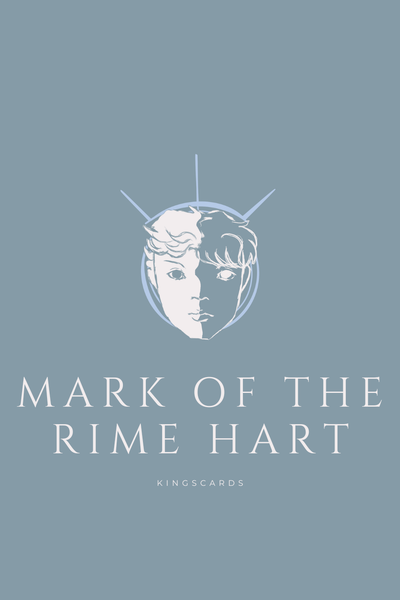Rime Hart—the very name itself evokes fear. Before the Long War, tales about the Rime Hart were well-known. A supposed nobleman-turned-terror, now a mysterious figure in children's tales, with only their malediction as evidence of existence.
In his wake, he marked those unfortunate enough to be caught in his wintry bane.
They call those afflicted the Coldfells, their frost-bitten flesh cursed to decay before spring’s thaw.
Emilio stared outside the glass window as people passed by, his mind wandering into contemplation about the everyday lives of ordinary people. He was confined within Sainte Victorin’s Home for the Afflicted; the sanatorium was hailed as a marvel of architecture and beauty, a historical landmark in the city of Cabianca.
His room, shared with other Coldfells, was wide, fitting multiple bunk beds with a night table for each. In the back of the room, a toy chest spilled stuffed animals and wooden blocks across the rug. Unlike Emilio, the afflicted sharing his space were younger. Turning fourteen in early January, he was perhaps the oldest.
The children were, to put it simply, miserable. Those who hadn't fully succumbed to the curse were old enough to recognize their shortened lifespan, no longer regarded as human. As the curse reached its final stages, whatever remained of their original form was erased—merely a husk of their former selves.
Each Coldfell shared the same traits: blotchy white skin, cloudy blue eyes, and blue lips for those not completely turned. Emilio was no different; half his body had succumbed to the curse. With one brown eye and parts of his hair retaining its light brown color, he still looked "human enough," as some of the sisters would say.
His daydreams were interrupted by a knock at the door. Emilio slipped off the windowsill, leaping down from the bunk. Coldfells in the room turned their attention to the door as Emilio sprinted over to open it.
A nun stood in the doorframe, her face adorned in dark brown. A veil covered her face, visible enough to make out her eyes. She bowed her head, giving Emilio and the other children a faint smile.
“Greetings, Emilio. Mother Superior would like to see you,” she said in a soft voice.
Emilio could only make assumptions about what the meeting pertained to, but he felt that he knew what was coming.
“Let’s just go then,” he responded coldly, and the nun bowed her head again.
Emilio and the nun passed through the sanatorium’s corridors. The hallways were empty, save for only a few echoes of footsteps on the polished floors. The ornate windows of the institution filtered soft light, casting a gentle glow on the antique furniture.
Imagery of a heavenly figure adorned the sanatorium—a face with divine wings cradling sacred artifacts: a bottle, a candle, and bunches of herbs, shrouded in sacred cloth, reminiscent of the sisters' attire.
The nun stopped, taking a position next to the door—it was none other than the Mother Superior’s office. The doors to the room were ornate, made of expensive wood. The handles were golden, parts of them brighter due to the number of times hands had grasped them.
The nun opened one of the doors for Emilio but did not enter. As Emilio paced into the room, the door shut behind him. He turned to look at the woman behind the desk in front of him. The Mother Superior Angelina, a woman in her mid-fifties, bore the same shadowy vestments as her fellow sisters—dark brown robes that clung to her form, and a white veil obscuring her eyes.
“Good day, thank you for coming,” the Mother Superior said, “I trust you’re doing well. I know it’s been hard since your brother passed.”
“It’s gotten easier,” he murmured.
The Mother Superior acknowledged him with a solemn nod. “Very well, as I'm sure you're aware, there's something we need to discuss," she began, motioning for Emilio to take a seat.
"Emilio," the Mother Superior rose from her seat and continued, "you've graced the halls of this Sanatorium for what seems like your entire life, haven't you? And, of course, you're fully aware of your peculiarity. You present quite an intriguing case."
“Unfortunately, we cannot continue to provide care for you, it isn’t in our best interest to do so.” She said, her hands clasped behind her back, giving time for Emilio to sink into the situation, “However, we have options for you.”
“So you’re evicting me?”
“I wouldn’t put it so strongly–”
“I’ve known nothing but the Sanatorium, this has been my life, and you so easily cast me out?” Emilio interjected, the fear and uncertainty filling his voice.
“You never had a life; your life ended when you were hexed,” Angelina said, her voice more stern than before. “The Sainte would not appreciate us saying you're an abomination, but we all think so.”
She cleared her throat, once again trying to hide her terseness with sincerity, “I have one proposition you should consider: The Arcanium. You might as well donate your body to the purpose of the study.”
Emilio frowned slightly. The idea of being used as a research subject didn't bring him joy, but if it meant having somewhere to go, it might be his only option for survival.
“You’ve got until the end of the day to collect your items. If you decide to take my offer, then I shall send a letter to the institution tonight.”
“Can’t I spend just one more night here? I’ve got no place to stay,” Emilio pleaded.
"End of the day, Emilio. I will not repeat myself," the Mother Superior's voice, icy as a winter breeze, sliced through the silence.
“But—“
“If there’s nothing else, then please see yourself out,” the Mother Superior cut him off and gestured to the door. Emilio’s shoulders dropped, but he did not hesitate to get out.
So this was it, Emilio’s only home—one he disdained, was no longer his. He’d never walk through these halls again. Emilio looked at the statue of the Sainte, a face he’d known for his entire life, now casting a cold gaze at him. Then he turned around and walked out of the Sanatorium.












Comments (16)
See all